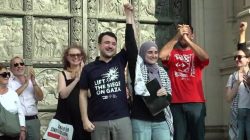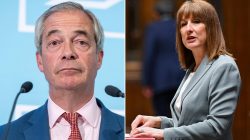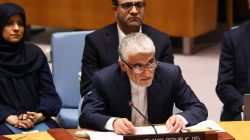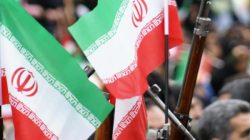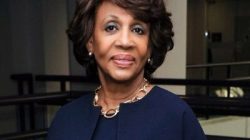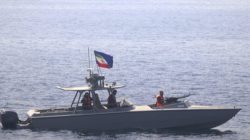Hilarion Etong, the president of the Parliamentary Assembly of La Francophonie (APF), has shown hope regarding the creation of an inter-parliamentary committee involving both Rwandan and Congolese legislators. He sees this initiative as a way to bolster attempts aimed at finding a lasting resolution to the ongoing strife in eastern Democratic Republic of Congo.
Also read:
Ex-Congolese President Kabila criticizes the ‘demagogic’ Tshisekedi administration for spreading falsehoods and embracing populism.
On Wednesday, May 28, he noted during his delegation’s visit to the Rwandan Parliament.
ALlso read:
Provisions from the agreement between Rwanda and DR Congo, which was signed in Washington DC, focusing on key principles.
The visit aligns with APF’s parliamentary role dedicated to “good offices,” aiming to facilitate sustainable resolutions to the ongoing conflicts in eastern DR Congo. This strategy falls under the APF’s broader goals of encouraging dialogue, fostering peace, advancing democratic governance, upholding human rights, and strengthening unity among member states.
Rwandan Senate President François-Xavier Kalinda characterized the APF mission as “highly significant for us” due to its role in bolstering bilateral collaboration, parliamentary diplomacy, and peace and security within the Great Lakes region.
The APF group traveled to Rwanda following their visit to DR Congo. Both nations are part of La Francophonie, which is an organization comprising French-speaking countries.
Also read:
What’s occurring in DR Congo is being described as an ethnic war by Kagame when addressing regional leaders.
Etong mentioned that within the framework of the good offices mission, they hear out both sides [DR Congo and Rwanda]. He further stated that “the desire for peace is evident” in these nations.
He stated that they cannot yet claim to have reached a conclusion regarding the impact of the talks, noting that the trend appears to be moving toward forming an inter-parliamentary committee consisting of both Rwandan and Congolese parliamentarians. This committee would convene and share insights at times in Kigali and at others in Kinshasa.
Also read:
M23 accuses Congo’s army of being responsible for instances of violence and misconduct surfacing in South Kivu.
Kalinda stated that the dispute in eastern Democratic Republic of Congo ranks among the most intricate and enduring conflicts on the continent.
Kalinda pointed out that the conflict has its profound origins in a mix of historical, political, economic, identity, and geopolitical elements. She highlighted that these underlying issues are intertwined with the legacy of colonization, the aftermath of the 1994 genocide against the Tutsi, ethnic and frontier disputes, the frailty of governmental structures, and the lack of effective leadership.
Regarding the legacy of colonialism, he stated that Belgian colonizers departed from a nation marked by political instability, haphazardly drawn boundaries, and an absence of national cohesion.
Kalinda noted that ethnic divides have been exploited, benefiting some groups at the cost of others, thereby fostering mistrust and tension. She highlighted that in eastern Democratic Republic of Congo, there has historically been rivalry among local communities focused on land rights, citizenship, and control over authority.
Kalinda stated that certain groups, like the Congolese Tutsi, often face stigma and are seen as outsiders, fueling ethnic animosity and conflict.
Following the genocide targeting the Tutsi population in Rwanda during 1994, hundreds of thousands of refugees—including those involved in the atrocities—settled in eastern Democratic Republic of Congo. They formed a militant organization known as the FDLR, according to what was shared with the visiting delegation. This armed faction has consistently utilized eastern DRC as their stronghold for activities aimed at unsettling Rwanda, leading to ongoing regional instability.
Regarding the frailty of state institutions and the lack of governance, he pointed out that the Congolese government fails to exert genuine authority over the eastern part of the nation, thereby creating a security void that has been filled by approximately 250 operational armed groups.
Bribery, the misuse of the military, and the lack of public services exacerbate the susceptibility of the people.
“Rwanda keeps criticizing the ongoing activities of the FDLR, despite being labeled a terrorist organization by entities such as the United Nations, the African Union, and the European Union. This group persists in operating within DR Congo with backing from the Congolese military forces,” he stated.
He stated that by overlooking the underlying reasons for the conflict, both the Congolese government and the global community have led to a deliberate misinterpretation of the crisis in eastern Democratic Republic of Congo. The situation has been oversimplified, focusing merely on baseless claims against Rwanda regarding illicit resource extraction and territorial ambitions.
Also read:
Who Are the M23 Rebels in Democratic Republic of Congo?
The condition deteriorated further when the M23 rebellion resurged in November 2021, compounded by the Congolese government’s reluctance to enforce the Nairobi Declaration signed in 2023.
Kalinda emphasized that Rwanda has consistently advocated for a political resolution. This approach includes removing foreign forces from the military alliance in DR Congo and facilitating direct negotiations between the Congolese government and M23 to address both the underlying issues driving the conflict and dealing with the FDLR threat.
“Lingering security assurances are essential for Rwanda along its frontier with DR Congo,” he stated additionally.
Provided by Syndigate Media Inc. (
Syndigate.info
).

